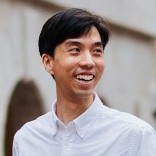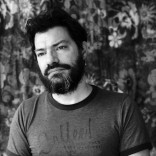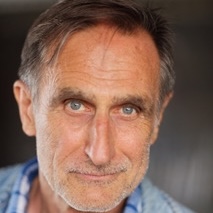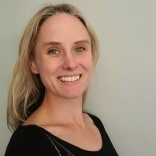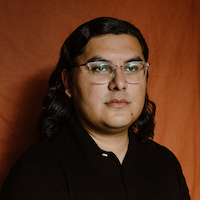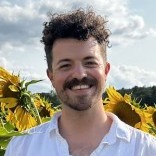Separation
Andrea Bradley
The mother waits in the reception area. Her hands are folded on her lap like two sparrows, nesting. If she does not hold them still, they will fly, stun themselves against the fogged windows, fall to a floor grimed with February slush. She is used to waiting, this mother, though it does not get easier.
To pass the time, she looks around at the other weary faces gathered here. Another mother, ashen around the eyes, too-quiet toddlers curled at each side. A family—Burmese perhaps, or Tibetan—colouring at a small table in the corner. Two rangy men with the look of a hard road about them. A girl laughing, incongruously, silently, at something on her phone.
She does not see herself in any of them. They are strangers as much as the girl at the reception desk. But a strange sort of kinship pervades the room. Each here, pinned to hard plastic, pierced by a dozen needles, invisible threads twining and tangled and pulling them in all compass directions. Pulling them, futilely, home.
~
The young lawyer’s belly is tight. False contractions, they call it. A surface-level spasming that is all-encompassing. It’s early for this to be happening, but not unheard of. She googles it daily, between clients, on her commute home, searching for a different website, a new answer—something she has done for every symptom that has arisen in the course of her pregnancy. Nipples puckered like raspberries? Potent sweat? The sensation of floating through mist, flooded by unknowns, thoughts without traction?
She picks up the eternal knot figurine that rests by her monitor, a gift from one of her first clients. For a moment, she can’t remember his name. It drifts past in the fog, then lands at her lips. Tenzin. Of course. She has worked at this clinic for just three years, but already the names swirl and muddy. The ones she has been able to help and the ones she cannot. A few bob to the surface, always clear, but the rest get swept away in the current.
She picks up the phone and calls reception, asks for the next client to be sent in.
~
They face each other across the desk, mother to mother. Their shared status acknowledged, briefly, at the first meeting, and swallowed since. The mother senses the young lawyer does not want to be asked about her baby. There is more than a desk between them. The lawyer feels she should not speak of joy. She tries to hide her swelling, does not wish to remind her client of what she has lost.
“Have you heard anything yet?” The mother asks, sparrow hands embracing.
The lawyer shakes her head minutely, softens it with a smile. “I’m so sorry, Fabiola. I call IRCC every week and there is never an update. The processing delays are unacceptable. I know you know this. I think it’s time we consider judicial review. We can seek a mandamus from the Federal Court to force a decision on your daughter’s case. But I have to be honest, even that will take time, with no guarantee of results. Courts are reluctant to intervene except in the most egregious cases.”
Fabiola knows the meaning of egregious. She understands, even, what a mandamus is. She has not come to this office without having done her homework. But these words do not fit together in her mind in the way they flow from this lawyer’s mouth.
“I have not seen my daughter in three years.” She says it quietly. It is that, or fury. “If that is not egregious, what is?”
“I know,” the lawyer says. Her right hand rests on her stomach. She breathes through the next contraction. “I know and I don’t. I can’t even begin to understand what you are going through but know that I’m working as hard as I can. We will get your daughter here, whatever it takes.”
The words fall, useless, to the desk between them.
~
Fabiola, at home, is just that. Fabiola. She is not a mother here, in the four white walls of this studio apartment. Outside, the sky is as grey as a poorly laundered shirt. She pulls the curtains and turns on the stove. Tonight, she will cook. She will fill the hallways with the scent of frying onions. She will stain her fingertips with cilantro. She will eat gallopinto and watch Big Brother until her mind is empty of everything but self-loathing.
She will let it consume her, starting with her heart. It will gnaw her from the inside out, pick clean her ribs, break open the cavity of her chest, tear through her breasts, raw grief in the hollows that once nourished a girl.
Her girl.
She is twelve now, growing breasts of her own. The last picture her mother sent, she was still smiling, in her school clothes, two fingers raised in peace. Fabiola saw the swell beneath her blouse and knew the jackals would be close. She does not have much time. Every picture she opens with a tight throat, waiting to see that smile disappear.
But Immigration knows nothing of this. Fabiola is as faceless to them as they are to her. A number or, at most, a name. Black lines on a white screen, mercilessness disguised as bureaucracy.
~
The lawyer is on the subway when her waters break. The midwives told her it rarely happens this way. Life is impolite; it does not announce its arrival with a flood. The waters arrive unexpected—a slow seepage, quiet as the passage of time. It takes her from Lansdowne to Pape to realize that her underwear is wet and then she must contain the rising panic for three more stops.
At home, the lawyer is Emma. She has two cats, a partner, and the ground floor of a rented row house. They have a car, rarely used, which crawls them to the hospital, where it will be confirmed that Emma’s sac has ruptured. The midwife tells her there is a name for this. Premature Rupture of Membranes. PROM, as though Emma’s child is graduating from her womb, when it feels like an expulsion.
The midwives fuss and flutter. The new one, the trainee, takes three tries to thread the IV. A Pitocin drip begins.
“What will it feel like?” Emma asks the elder midwife, who has mothered so many mothers in her time. Her dry hand on Emma’s forehead is a nesting bird and Emma is no longer a lawyer. She is leaf in a river and her heart is on the banks, running to keep up.
~
Two days after the birth, Fabiola goes back to the legal clinic. There is news, though not from the lawyer. There is never news from the lawyer. Fabiola has heard that a girl her daughter walks to school with has been assaulted. The panic chokes Fabiola, like a thousand water beetles scrabbling inside her throat. She wants them to fly with her words and swarm the receptionist whose eyebrows writhe in sympathy, who cannot understand the urgency.
“I’m sorry, but Emma is off on early maternity leave. Your file is being transferred to another lawyer. I can take a note for now.”
“She said she would get a mandamus. I have evidence that my daughter is in danger now. Can you please get someone to help me? It cannot wait.”
The receptionist is sorry. She is powerless. They are all powerless—Immigration, the lawyers, Fabiola, her daughter—thin legs beating against a relentless current.
“Give me my file, then. I will write the letter myself,” Fabiola says.
“I don’t think that’s a good idea.”
Internally, Fabiola screams, and the beetles fly, skimming low across salt water, dodging gulls, arriving, wind-battered on a distant shore. They drag her daughter past tankers, across tides. They drag her daughter home.
~
Emma holds her baby, with her winter apple face, darkly red and wrinkled. She fills her with fluid and gradually, her complexion eases. This daughter is her heart, pumping outside her body. She is awash with hormones, with ecstatic gratitude for the hands that held her open while she separated in two. For the nameless nurses who came in the quiet hours to bathe and coach her, the patient midwives, the wan mothers smiling in the halls. Even the hospital—that stark institution—will take on a warm glow in Emma’s memory. For a time, she will remember nothing of her work, as her daughter fills her whole world.
She hums as she nurses to drown out the buzz at her window. A beetle, frantic, battering at the glass.

